- Home
- »
- Medical Devices
- »
-
Auto-Injectors Market Size, Share, & Trends Report, 2030GVR Report cover
![Auto-Injectors Market Size, Share, & Trends Report]()
Auto-Injectors Market Size, Share, & Trends Analysis By Type (Disposable, Reusable), By Disease Indication (Rheumatoid Arthritis, Multiple Sclerosis), By End Use, By Region, And Segment Forecasts, 2024 - 2030
- Report ID: GVR-3-68038-397-3
- Number of Report Pages: 130
- Format: PDF, Horizon Databook
- Historical Range: 2018 - 2023
- Forecast Period: 2024 - 2030
- Industry: Healthcare
Auto-Injectors Market Size & Trends
The global auto-injectors market size was estimated at USD 8.35 billion in 2023 and is projected to grow at a CAGR of 14.4% from 2024 to 2030. The market is driven by the increasing prevalence of chronic diseases like diabetes and anaphylaxis, necessitating user-friendly medication delivery systems. Rising awareness of self-administration benefits, advancements in biologics, and technological innovations enhance safety and ease of use. Supportive government policies, increased healthcare expenditure, and demand for minimally invasive devices further boost market growth, alongside the need for rapid medication in emergencies.
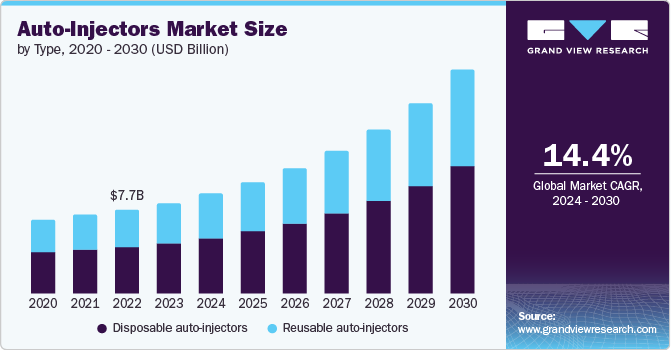
Auto-injectors are favored over conventional devices due to their efficient and enhanced drug delivery capabilities and compatibility with new formulations. They offer several benefits, including reduced needle phobia and anxiety, decreased risk of needle stick injuries, consistent dose accuracy, and improved efficacy, driving market growth. Drug delivery via auto-injectors is more controlled compared to manual injections. While the injection site varies based on the drug, it is typically administered intramuscularly. Auto-injectors are also less painful than syringes, further increasing their demand.
According to a September 2021 NCBI study, auto-injectors significantly benefit users and healthcare professionals in emergencies and chronic disease management. They are recommended for conditions such as anaphylaxis, migraines, epilepsy, psoriasis, diabetes, multiple sclerosis, and rheumatoid arthritis. Over 20 pharmaceutical companies have developed around 80 auto-injectors, with nearly 50 drugs designed for use with these devices. About 62% of the auto-injectors are disposable.
There is significant growth in reusable auto-injectors with multiple dosing. Auto-injectors provide safety, efficacy, and fast drug absorption, and their cartridges can be replaced for reuse. They are useful for delivering emergency drugs to children and can administer antidotes and animal vaccines. In disasters, auto-injectors are valuable for rapid drug delivery and are safe for many lifesaving medications. A list of auto-injector devices for administering various drugs currently in use and under clinical trials.
The global market is rapidly growing due to the rising prevalence of anaphylaxis and food allergies. Anaphylaxis, a severe and rapid allergic reaction, can occur due to food allergies. It causes symptoms like difficulty breathing, swelling, hives, and a drop in blood pressure. For instance, according to Asthma and Allergy Foundation of America data published in April 2024, over 100 million people in the U.S. suffer from various allergies annually, including seasonal allergies, food allergies, and eczema. Nearly one in three U.S. adults and over one in four U.S. children have a seasonal allergy, eczema, or food allergy. Each year, anaphylaxis due to food allergies leads to an estimated 90,000 emergency room visits in the U.S.
According to FARE (Food Allergy Research & Education), researchers estimate that approximately 33 million Americans have food allergies, with 5.6 million being children under the age of 18. This accounts for approximately one in 13 children, or about two, in every classroom. Around 40% of children with food allergies are allergic to multiple foods. Studies published in 2018 and 2019 also provide estimates of Americans of all ages experiencing convincing allergy symptoms to specific foods.
Innovations in device functionality are expected to strengthen market expansion. For instance, in August 2023, Phillips-Medisize was awarded its third industry honor for the SKYTROFA Auto-Injector at the Red Dot Design Awards in Germany. This device, recognized for its design, is reusable and rechargeable, reducing the environmental impact of disposable injector pens and batteries. Each full charge supports weekly injections for up to four weeks. The auto-injector's lifespan spans approximately four years or 210 injections, emphasizing its longevity and efficiency in drug delivery systems.
Market Concentration & Characteristics
The market exhibits notable industry concentration, with key players focusing on innovation and product differentiation. Companies like Eli Lilly, Pfizer Inc., and Mylan N.V. dominate the market, leveraging advanced technologies to improve safety and user experience. Key characteristics include a shift towards reusable and sustainable devices, reducing environmental impact. Market growth is driven by rising incidences of allergies and chronic diseases, necessitating reliable drug delivery systems. Regulatory support and increasing healthcare expenditure further propel market expansion. The industry's competitive landscape emphasizes continual device functionality and design advancements to meet evolving patient needs and regulatory standards.
The auto-injector industry demonstrates a high degree of innovation, with advancements focusing on enhancing safety, usability, and sustainability. Key developments include reusable and rechargeable devices, integration of smart technologies for better dose accuracy, and user-friendly designs to reduce needle anxiety. For instance, in July 2023, researchers at Western University developed an open-source, 3-D printed autoinjector that costs a fraction of commercial versions. The device, costing under USD 7 to produce, aims to improve healthcare access in disadvantaged communities. It's reusable, easy to manufacture, and ensures safe, self-administered medication, enhancing treatment for diabetes and anaphylaxis.
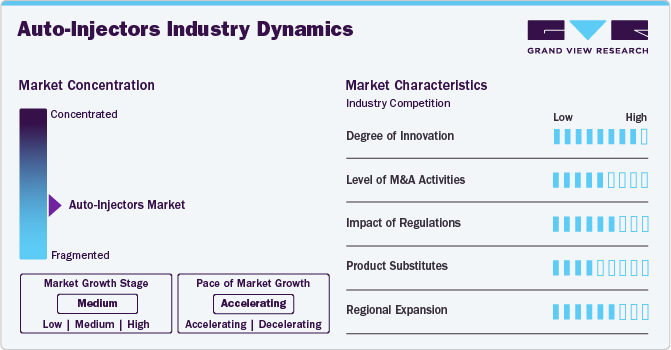
Regulations significantly impact the auto-injectors industry by ensuring safety, efficacy, and quality standards. Stringent guidelines from agencies like the FDA and EMA mandate rigorous testing and approval processes, which drive innovation and improvement in device design. Compliance with these regulations enhances consumer confidence and market adoption. Furthermore, regulatory support for sustainable practices and reusable devices promotes environmental responsibility. However, meeting regulatory requirements can increase development costs and time-to-market, influencing competitive dynamics and pricing within the industry. Regulations shape the industry landscape by balancing patient safety with technological advancement.
Mergers and acquisitions in the auto-injectors industry are rising due to the need for research and development, reflecting the industry's dynamic nature. Companies are leveraging M&A activities to innovate and offer advanced solutions that meet the evolving needs of healthcare professionals. For instance, in November 2021, Gerresheimer acquired the intellectual property of an autoinjector from Midas Pharma. This new autoinjector supports subcutaneous injections up to 3ml and is designed for various therapeutic areas, including highly viscous biological APIs. It provides biotech and pharma companies a versatile, patient-friendly option for treating numerous diseases. This development expands Gerresheimer's portfolio, which already includes on-body and wearable injector solutions.
In the auto-injectors industry, product substitutes include traditional syringes and needle-free injection systems. Conventional syringes are less expensive but lack the convenience and user-friendliness of auto-injectors. Needle-free injection systems offer a pain-free alternative, appealing to patients with needle phobia. However, these substitutes may not provide the same dose accuracy and ease of use as auto-injectors designed for reliable, self-administered medication delivery. Emerging technologies and advancements in drug delivery systems continue to enhance the auto-injector market's attractiveness over these alternatives.
Companies are targeting various regions due to the rising prevalence of chronic respiratory conditions and increasing healthcare investments in emerging markets. Regional diversification boosts companies' global market presence and enhances access to advanced auto-injectors in underserved areas, promoting healthcare improvements. For instance, in May 2024, Gerresheimer is expanding its Peachtree City, Georgia site with a USD 180 million investment. The expansion will increase the production of medical systems like inhalers and autoinjectors and create over 400 new jobs. The project will be completed in two stages, with production ramping up by the end of 2024 and mid-2025.
Type Insights
The disposable auto-injectors segment accounted for the largest market share of 56.03% in 2023, showing the fastest CAGR over the forecast period. They are primarily used for self-administration by patients with chronic conditions like diabetes, rheumatoid arthritis, and severe allergies. These devices offer several advantages, including convenience, ease of use, and improved compliance with treatment regimens. Typically, disposable auto-injectors are designed to be simple and intuitive. They often feature one-step activation, where the user must press the device against the skin to administer the medication. This design helps reduce anxiety and errors associated with manual injections. In addition, many auto-injectors have safety features like needle shields and audible or visual cues to indicate successful delivery.
The market for disposable auto-injectors is driven by the increasing prevalence of chronic diseases, advancements in biologic drugs that require precise dosing, and the growing trend towards home healthcare. Key players in this market focus on innovation, such as developing auto-injectors with digital connectivity to monitor usage and adherence.
Indication Insights
The diabetes segment accounted for the largest market share of 27.35% in 2023. This dominance is due to the high prevalence of diabetes worldwide and the necessity for regular insulin injections among diabetic patients. Auto-injectors provide a convenient, reliable method for self-administration of insulin, improving patient compliance and managing blood glucose levels. Innovations in auto-injector technology, such as easy-to-use designs and digital connectivity for monitoring dosage, further boost their adoption. The growing diabetic population and increasing awareness and preference for advanced drug delivery systems continue to drive significant demand in this segment.
Themultiple sclerosis segment shows the fastest CAGR over the forecast period. This growth is driven by the rising prevalence of MS and the increasing adoption of disease-modifying therapies (DMTs) that require regular, precise dosing. Auto-injectors offer MS patients enhanced convenience and adherence through easy self-administration and innovative features, such as needle shields and audible cues. As new DMTs are introduced and patient preference for home-based treatments grows, the demand for advanced auto-injectors in the MS segment is expected to surge significantly.
End Use Insights
The homecare settings segment accounted for the largest revenue share of 55.05% in 2023, showing the fastest CAGR over the forecast period. Auto-injectors enable easy, safe self-administration of medications, reducing the need for frequent healthcare visits and offering greater convenience. For instance, Otsuka Pharmaceutical Co., Ltd. (Otsuka) announced the November 2022 launch of a new auto-injector version of AJOVY Subcutaneous Injection 225mg (fremanezumab) in Japan. With physician approval, this formulation is approved for home self-injection every four weeks. This new treatment option is designed to decrease patient hospital visits and improve the ease of administration.
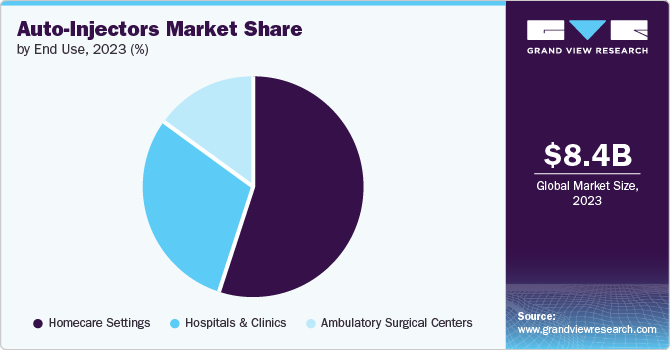
This segment benefits from the increasing prevalence of chronic diseases, such as diabetes and multiple sclerosis, which require regular injections. Moreover, advancements in auto-injector technology, such as user-friendly designs and enhanced safety features, make them ideal for home use, further propelling their adoption and contributing to the segment's substantial revenue share.
Regional Insights
North America auto-injectors market dominated the overall global market and accounted for the 45.27% revenue share in 2023. The high prevalence of chronic diseases such as diabetes, anaphylaxis, and rheumatoid arthritis drives the North American market. Advanced healthcare infrastructure, increased awareness about self-administration of drugs, and technological innovations in drug delivery systems contribute significantly to market growth. Major companies are investing in research and development to introduce user-friendly and efficient auto-injectors. Supportive government policies and high healthcare expenditure further strengthen market expansion.
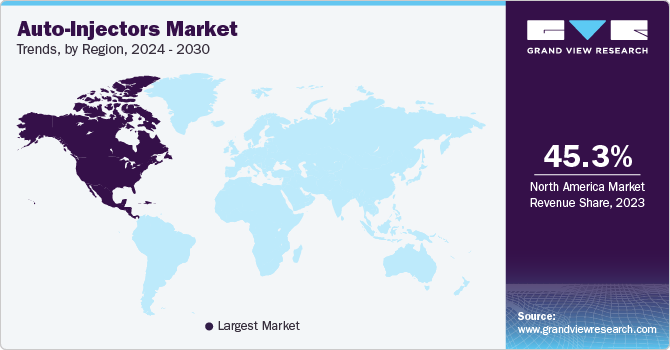
U.S. Auto-Injectors Market Trends
The auto-injectors market in the U.S. held a significant share of North American market in 2023. Advancements in medical device technologies, enhanced healthcare facilities, and a strong demand for high-quality products drive growth in the U.S. auto-injectors market. With over 25 million Americans affected by asthma and allergies ranking as a significant chronic health issue, the region sees around 200,000 emergency cases annually due to food allergies, highlighting the anticipated rise in demand.
Europe Auto-Injectors Market Trends
The market for auto-injectors in Europe has experienced notable expansion, propelled by higher rates of chronic illnesses such as rheumatoid arthritis and multiple sclerosis. Companies like Stevanato Group have made substantial investments in scalable manufacturing and industrialization in Europe, focusing on tool design, injection molding, and metrology to ensure precision in producing high-quality components for devices like Aidaptus. These efforts contribute significantly to market growth by meeting increasing demand with reliable, well-crafted products.
The UK, the auto-injectors market is growing due to the rising prevalence of allergies, with over 20% of the UK population suffering from at least one allergy, making adrenaline auto-injectors (AAIs) vital for those at risk of anaphylaxis, capable of saving lives, according to Medicines and Healthcare products Regulatory Agency data published in June 2023. AAIs like Epipens and Jext are prescribed for these individuals. NHS Digital’s Hospital Episode Statistics reveal that allergy and anaphylaxis hospital admissions in England have almost doubled over twenty years, from 13,440 in 2001-02 to over 26,000 in 2021-22, increasing the market expansion.
The auto-injectors market in France is evolving with a focus on health monitoring for chronic conditions like diabetes and cardiovascular diseases. For instance, according to the IDF Report 10th edition, by 2045, France is expected to have 4,225.7 thousand individuals aged 20-79 living with diabetes. French healthcare policies emphasizing patient-centered care and technological advancements support market expansion.
Germanyauto-injectors market is experiencing notable growth. German manufacturers have established a strong reputation for producing high-quality medical devices. The country’s rigorous quality control standards and adherence to safety regulations further enhance this reputation. As a result, healthcare providers trust German-made medical devices, leading to increased sales and market dominance.
Asia Pacific Auto-Injectors Market Trends
The auto-injectors market in Asia Pacific is experiencing significant growth, driven by the rising prevalence of chronic diseases, increased awareness about advanced drug delivery systems, and growing demand for self-administration options, contributing to market expansion. Improvements in healthcare infrastructure and economic growth in countries like China, India, and Japan further support this trend. In addition, government initiatives to enhance healthcare access and affordability boost market development. The entry of key market players and increasing investments in research and development for innovative auto-injector technologies are also pivotal in driving this region's growth.
Japanauto-injectors market is poised for rapid growth, driven by innovations in auto-injectors, such as battery-free, high-tech patches for monitoring lifestyle-related diseases like heart disorders, stress indicators, and sleep apnea. These advancements offer continuous health monitoring with minimal discomfort, appealing to Japan's aging population and their increasing focus on health management.
Theauto-injectors market in China is expected to grow in the Asia Pacific in 2023 due to the increasing demand for wearable patches and technological advancements. For instance, in November 2019, scientists in China developed a wearable silk patch capable of real-time measuring various health biomarkers, such as glucose, lactate, and potassium. The patch targets healthcare and sports applications, leveraging silk's biocompatibility and sensitivity to biological changes. This innovation addresses growing demands for personalized health solutions in the region.
India auto-injectors market is experiencing significant growth, driven by the rising prevalence of chronic diseases such as diabetes and rheumatoid arthritis. Increasing awareness and adoption of self-administration devices are boosting market demand. Auto-injectors offer convenience, safety, and improved compliance, making them a preferred choice for patients. The Indian market also benefits from advancements in auto-injector technology and supportive government initiatives promoting home healthcare.
Latin America Auto-Injectors Trends
The auto-injectors market in Latin American is fueled by the growing elderly demographic. Aging increases vulnerability to numerous chronic ailments, prompting the need for auto-injectors as a treatment option. This, coupled with the demand for medications, is propelling market growth in the region.
Saudi Arabia Auto-Injectors Market Trends
The auto-injectors market in Saudi Arabia is anticipated to expand in the forecast period. The growing geriatric population, which is highly susceptible to chronic diseases, is one of the major factors positively influencing the market growth in this country. For instance, according to the Saudi Arabian Monetary Agency (SAMA), the proportion of the Saudi Arabian population aged 60 and above is estimated to reach 25% by the end of 2050.
Key Auto-Injectors Company Insights
The market is highly competitive, with key players such as Eli Lilly, Gerresheimer, and Sanofi holding significant positions. The major companies are undertaking various organic and inorganic strategies such as new product development, collaborations, acquisitions, mergers, and regional expansion to serve the unmet needs of their customers.
Key Auto-Injectors Companies:
The following are the leading companies in the auto-injectors market. These companies collectively hold the largest market share and dictate industry trends.
- Eli Lilly
- SHL Medical AG
- AbbVie, Inc.
- Amgen
- Owen Mumford
- Ypsomed
- Teva Pharmaceutical
- Biogen Idec
- Mylan N.V.
- Pfizer, Inc.
- Sanofi
- Gerresheimer
Recent Developments
-
In March 2024, Ypsomed is selling its insulin pen needle and blood sugar monitoring operations to MTD Group to focus on smart pumps and autoinjector development. This shift allows Ypsomed to invest over USD 111 million in expanding its Solothurn site. The transition, which will retain jobs until the end of 2024, will see Ypsomed as a contract manufacturer until mid-2025.
-
In October 2023, Altaviz introduced the AltaVISC auto-injector platform for drug delivery, designed to handle high-volume and high-viscosity biologics. Pico-cylinders enable precise and sustainable drug administration by controlling temperature and gas composition. This platform supports various drug formulations, including shear-sensitive molecules, and with its innovative technology, it aims to improve at-home treatments.
-
In May 2023, Revive Innovations, an InnovationRCA start-up, created a stylish, compact auto-injector designed to fit easily into a pocket or handbag, reducing stigma and inconvenience for users. The device aims to make it easier for people to carry life-saving auto-injectors for allergic emergencies.
-
In April 2022, Halozyme is set to acquire Antares Pharma to enhance its drug delivery capabilities, particularly in the auto-injector platform. This acquisition aims to combine Halozyme's ENHANZE technology with Antares' expertise in auto-injectors, promising significant advancements in subcutaneous drug delivery for various therapeutic areas.
Auto-Injectors Market Report Scope
Report Attribute
Details
Market size value in 2024
USD 9.18 billion
Revenue forecast in 2030
USD 20.59 billion
Growth rate
CAGR of 14.4% from 2024 to 2030
Actual data
2018 - 2023
Forecast period
2024 - 2030
Quantitative units
Revenue in USD million/billion and CAGR from 2024 to 2030
Report coverage
Revenue forecast, company ranking, competitive landscape, growth factors, and trends
Segments covered
Type, indication, end use, region
Regional scope
North America; Europe; Asia Pacific; Latin America; MEA
Country scope
U.S.; Canada; Mexico; UK; Germany; France; Italy; Spain; Denmark; Sweden; Norway; Japan; China; India; Australia; Thailand; South Korea; Brazil; Argentina; South Africa; Saudi Arabia; UAE; Kuwait
Key companies profiled
Eli Lilly; Scandinavian Health Ltd.; AbbVie, Inc.; Amgen; Owen Mumford; Ypsomed; Teva Pharmaceutical; Biogen Idec; Mylan N.V.; Pfizer, Inc.; Sanofi; Gerresheimer AG
Customization scope
Free report customization (equivalent up to 8 analysts working days) with purchase. Addition or alteration to country, regional & segment scope.
Pricing and purchase options
Avail customized purchase options to meet your exact research needs. Explore purchase options
Global Auto-Injectors Market Report Segmentation
This report forecasts revenue growth at global, regional & country levels and provides an analysis on the latest industry trends and opportunities in each of the sub-segments from 2018 to 2030. For this study, Grand View Research has segmented the global auto-injectors market report based on type, indication, end use, and region:
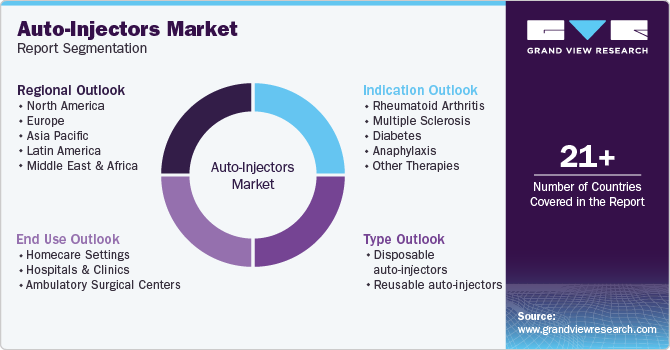
-
Type Outlook (Revenue, USD Million, 2018 - 2030)
-
Disposable auto-injectors
-
Reusable auto-injectors
-
Prefilled
-
Empty
-
-
-
Indication Outlook (Revenue, USD Million, 2018 - 2030)
-
Rheumatoid Arthritis
-
Multiple Sclerosis
-
Diabetes
-
Anaphylaxis
-
Other Therapies
-
-
End Use Outlook (Revenue, USD Million, 2018 - 2030)
-
Homecare Settings
-
Hospitals & Clinics
-
Ambulatory Surgical Centers
-
-
Region Outlook (Revenue, USD Million, 2018 - 2030)
-
North America
-
U.S.
-
Canada
-
Mexico
-
-
Europe
-
UK
-
Germany
-
France
-
Italy
-
Spain
-
Denmark
-
Sweden
-
Norway
-
-
Asia Pacific
-
Japan
-
China
-
India
-
Australia
-
South Korea
-
Thailand
-
-
Latin America
-
Brazil
-
Argentina
-
-
Middle East & Africa
-
South Africa
-
Saudi Arabia
-
UAE
-
Kuwait
-
-
Frequently Asked Questions About This Report
b. The global auto-injectors market size was estimated at USD 8.35 billion in 2023 and is expected to reach USD 9.18 billion in 2024.
b. The global auto-injectors market is expected to grow at a compound annual growth rate of 14.4% from 2024 to 2030 to reach USD 20.6 billion by 2030.
b. North America dominated the auto-injectors market with a share of 45.27% in 2023. This is attributable to advancements in medical devices technologies, advanced healthcare infrastructure, and high demand for quality products.
b. Some of the players operating in the market are Eli Lilly; Scandinavian Health Ltd.; AbbVie, Inc.; Amgen; Owen Mumford; Ypsomed; Teva Pharmaceutical; Biogen Idec; Mylan N.V.; Pfizer, Inc.; and Sanofi.
b. Key factors that are driving the market growth include an increase in the prevalence of anaphylactic shock, rise in awareness about these devices and preferences of patients to choose self-administration of injections.
Share this report with your colleague or friend.
![gvr icn]()
NEED A CUSTOM REPORT?
We can customize every report - free of charge - including purchasing stand-alone sections or country-level reports, as well as offer affordable discounts for start-ups & universities. Contact us now
![Certified Icon]()
We are GDPR and CCPA compliant! Your transaction & personal information is safe and secure. For more details, please read our privacy policy.
We are committed towards customer satisfaction, and quality service.
"The quality of research they have done for us has been excellent."





